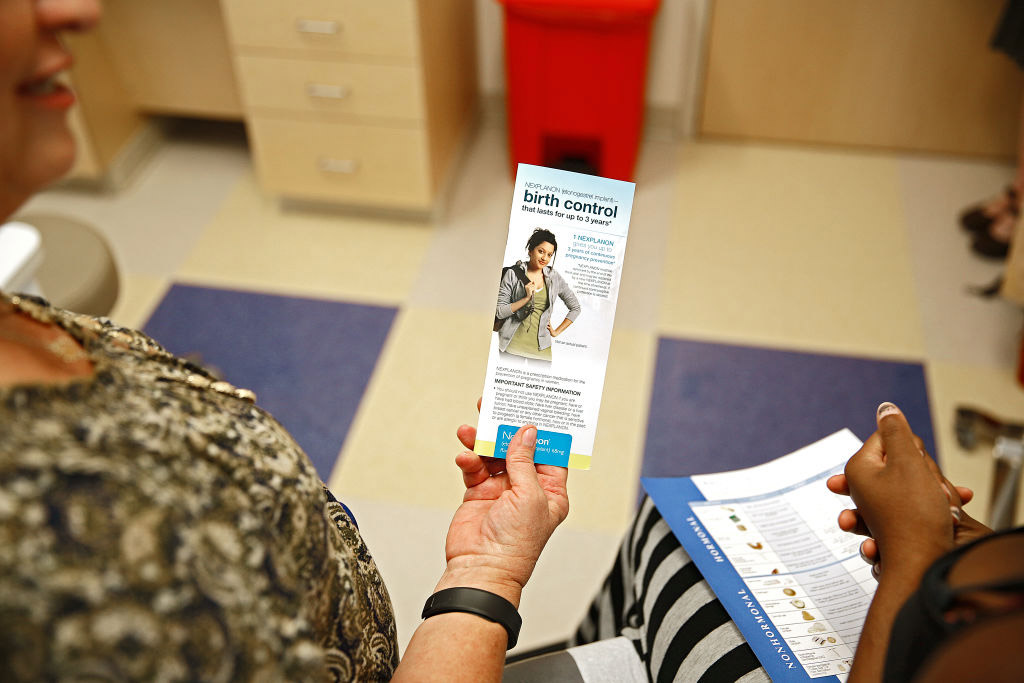Luanne Rohrbach was stunned when she got the letter from Washington: The federal money for her teen pregnancy prevention program was being shut off.
Rohrbach helps lead a program providing sexual health education for middle- and high-school students in Los Angeles and Compton, Calif. Called “Keeping It Real Together,” the initiative was supposed to reach 80,000 teens and their parents, as well as 55 schools, by 2020 in a community with a teen birth rate higher than the state average.
Now it may not be able to stay afloat.
The project is one of about 80 teen pregnancy prevention programs whose funding was ended two years early by the Trump administration, likely forcing them to shrink or close. Seven of the programs are based in California and receive about $7.9 million in annual grants.
“There was no reasoning and explanation [for the cuts]. It came as a complete surprise to grantees,” said Rohrbach, an associate professor at the University of Southern California’s medical school and principal investigator for the “Keeping It Real Together” project.
“We are certainly … looking for ways to sustain the program, but right now I am not aware of a source of funding that could enable us to do things at the scale that we do now.”
According to The Center for Investigative Reporting, the Trump administration axed $213.6 million from evidence-based teen pregnancy prevention programs and research nationwide. The federal Office of Adolescent Health recently notified the grantees of the cut.
The federal grant program was created under the first Obama administration, and a second cycle of funding was approved in 2015. Now the concern among program managers is that young people at highest risk will lose resources that in many areas were scarce to begin with.
The abrupt shortening of federal grants is “highly unusual,” said Chitra Panjabi, the president and CEO of the Sexuality Information and Education Council of the United States, which advocates for sex education for both teens and adults.
Panjabi cited the recent appointment of Valerie Huber, a prominent advocate of sexual abstinence for teens, as chief of staff to the assistant secretary for health at the federal Department of Health and Human Services, as a possible factor in the decision.
“It isn’t really surprising to me that she stepped into that role and then very shortly afterwards we’re seeing this rollback,” Panjabi said. “This is someone who does not believe in providing quality sex education for young people.”
Staff members at HHS, which oversees the Office of Adolescent Health, did not return a request for comment Friday.
The “Keeping it Real Together” project is a collaboration among USC, the Los Angeles County Department of Public Health and several community-based organizations. It provides comprehensive sexual education curriculum programs in Los Angeles and Compton. Additional workshops for parents aim to help them talk about sexual health with their teens.
Rohrbach said she hopes the California Department of Public Health might provide funding down the road, but that could be difficult.
At this point, the state agency doesn’t have money available to continue the California programs, said spokesman Ronald Owens in an email, although the department supports teen pregnancy prevention in other ways.
The agency estimates it will provide about $13.5 million to local health agencies and nonprofits in the next fiscal year for adolescent reproductive and sexual health programs, in addition to $2.4 million for programs to prevent sexually transmitted infections.
The program Rohrbach oversees had been receiving close to $2 million a year.
The early termination of funds also means that many of these programs will not get to measure their success. Many programs, Rohrbach said, had been preparing to evaluate whether they were helping to delay sexual activity and reduce teen pregnancy rates.
“We’re collecting a lot of data … but with the cutoff of the funds, we’re not in a position to do a thorough study,” Rohrbach said.
Sarah McQueen, program manager at San Diego Youth Services, said the loss of federal funds will stunt any progress that has been made in San Diego communities, an area that has seen sexually transmitted infections rise in recent years.
San Diego Youth Services received about $1.2 million a year to create a program to meet new state requirements for school districts to provide comprehensive sexual health and HIV prevention education at least once in middle school and once in high school.
McQueen said the program sends trained reproductive health educators to schools, assuming responsibility that often falls on harried science teachers, whose lesson plan for sexual health education might be limited to a chapter in a textbook. Thirteen full-time health educators’ jobs could be at risk, she said.
Another California-based group, the Center for Innovative Public Health Research, also will lose its federal grant, which funded its “Girl2Girl” text-messaging program for lesbian and bisexual teen girls. The seven-week text-messaging program sends girls daily messages meant to prompt conversations about relationships, pregnancy and about being a sexual minority teen, said Michele Ybarra, president and research director at the center.
Ybarra said that lesbian and bisexual girls are an especially vulnerable population. According to a study reported in the American Journal of Public Health, gay, lesbian and bisexual teens are twice as likely as heterosexual youth to report becoming pregnant or getting someone pregnant. That is most likely because most sex education programs are designed for heterosexual youth, and teens who identify as anything else feel that information does not apply to them, Ybarra said.
She has not found other money to support the program.
The federal Office of Adolescent Health was one of the few agencies that saw pregnancy prevention for lesbian and bisexual girls as a funding priority, which is why “this grant was so novel and important,” Ybarra said.


